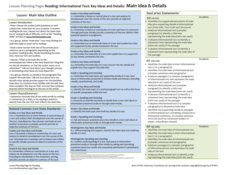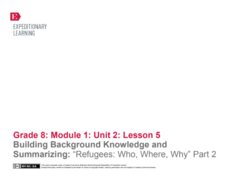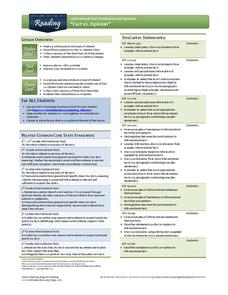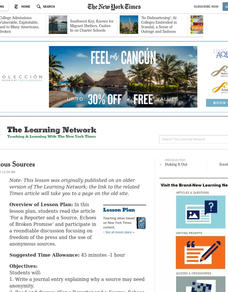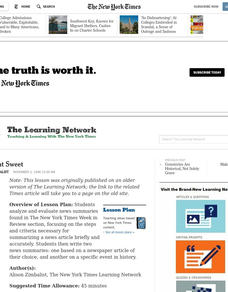For the Teachers
Main Idea Outline
Find the main idea in an informational text with a versatile lesson. Three levels of differentiation help you implement the strategy in any age or class level, based on the ability and objectives of your learners.
University of Kansas
Newspaper in the Classroom
Newspapers aren't only for reading—they're for learning skills, too! A journalism unit provides three lessons each for primary, intermediate, and secondary grades. Lessons include objectives, materials, vocabulary, and procedure, and...
Curated OER
Talk Common Core with Your Class
Familiarize your elementary, middle, or high school learners with Common Core language to increase their success.
American Press Institute
Introductory News Literacy
Aspiring journalists learn about media literacy, journalism, and the press. Units come complete with handouts, assignment rubrics, notes, and extension suggestions. Each unit also comes with a list of vocabulary words and learning...
PBS
March on Washington: A Time for Change
Young historians conclude their study of the events that lead up to and the planning for the March on Washington. After examining videos and primary source documents, they consider the civil rights objectives that still need to be...
EngageNY
Building Background Knowledge and Summarizing: “Refugees: Who, Where, Why” Part 2
What are some universal aspects of refugees' experiences worldwide and throughout history? Scholars read the text "Refugees: Who, Where, Why" and create two class anchor charts. Finally, they each write a paragraph that provides an...
EngageNY
Analyzing the Central Claim and Supporting Claims: “The Shakespeare Shakedown”
Scholars continue to analyze Simon Schama's article "The Shakespeare Shakedown." They participate in a jigsaw discussion to identify the author's argument and supporting claims. Pupils also write objective summaries of the text.
For the Teachers
Fact vs. Opinion
Many informational texts are written as factual, but can your learners determine when an opinion is presented as fact? Have your kids read several articles on the same topic and record the statements that contain either facts or...
Newseum
Is It Fair?
Young journalists learn how to analyze word choice, context, and counterpoints to judge the fairness of a news story. They practice using these tools to judge a series of headlines for the story of Goldilocks and the Three Bears. They...
Newspaper Association of America
The News
Young journalists learn about topics such as newspaper ethics, parts of a newspaper, credible sources, and different types of articles. The lesson empowers individuals and gives them the capability to express their voices through the...
Newspaper Association of America
Using the Newspaper to Teach the Five Freedoms of the First Amendment
Of all the amendments found in The Bill of Rights, the First Amendment contains some of the most important freedoms for American citizens. A unit plan on the First Amendment features interactive lesson plans designed to teach about those...
ESL Holiday Lessons
Bastille Day
Eleven worksheets follow an informative reading about Bastille Day. Scholars complete sentences found in the reading by matching, filling in the blanks, and choosing from a series of multiple-choice questions. Participants spell and...
Teaching Tolerance
Media Consumers and Creators, What Are Your Rights and Responsibilities?
Teach the class to separate fact from fiction. Scholars explore the topic of fake news as they read PEN America's News Consumers' Bill of Rights and discuss the rights and responsibilities outlined in the bill. Next, they read an article...
Teaching Tolerance
News Consumers' Bill of Rights and Responsibilities
Believe it or not, people have rights as new consumers. Scholars read PEN America's News Consumers' Bill of Rights and Responsibilities and work in small groups to paraphrase chosen sections of the text. Next, they create and present...
Teaching Tolerance
Social Media for Social Action
Engage in activism, not slacktivism! Scholars discuss social media and the Internet as tools for social change. Next, they engage in a close reading strategy called Thinking Notes as they read an article about social media activism.
Cornell College
Dred Scott v. Sandford Supreme Court Decision
Dred Scott was a harbinger of the Civil War. An enslaved man claimed freedom because his owner had taken him into free territory. Not only did the Supreme Court rule that Dred Scott and his wife were to remain enslaved, but it also ruled...
Curated OER
Persuasion as Text: Organizational, Grammatical, and Lexical Moves in Barbara Jordan’s "All Together Now"
A thorough activity on persuasive writing takes middle schoolers through several activities, including group discussion, collaborative posters, and independent writing. They compare historical speeches and analyze the persuasive...
Curated OER
Diving into Iceland's Genetic Pool
Investigate ethical issues surrounding the Decode project in Iceland. Middle and high schoolers take the positions of the Icelandic government, scientific researchers, and citizens and defend or refute the Decode project in a Reykjavik...
Curated OER
Press Review
How can word choice affect a political speech? Middle and high schoolers examine the text of the 1999 State of the Union Address, and then determine how newspaper articles and television reports describe and analyze the event. Use this...
Curated OER
Anonymous Sources in the Media
When do people ask for anonymity? Why? After reading the New York Times article "For a Reporter and a Source, Echoes of Broken Promise," young readers participate in a roundtable discussion focusing on freedom of the press and the use of...
Curated OER
Opinion Poll-arities
Students explore the mathematics behind opinion polls, as well as provides a framework for interpreting trends in opinion poll graphics.
Curated OER
Laughing Matters
Is laughter really the best medicine? Middle and high schoolers discuss the truth behind this adage by reading and discussing a New York Times article about Dr. Patch Adams. They participate in a round-table debate in response to...
Curated OER
Rockefeller's Revenge: Exxon and Mobil Unite
Study the impact and possible outcomes of the Exxon-Mobil merger in your language arts, social studies, or economics class. Secondary learners evaluate a series of graphs, write a paragraph interpreting the data, and engage in class...
Curated OER
Short But Sweet
After analyzing and evaluating news summaries found in the New York Times "Week in Review" section, middle schoolers study the steps for summarizing a news article briefly and accurately. They write two news summaries: one on a newspaper...
Other popular searches
- European Union Objectives
- Health Education Objectives
- Subjective and Objective
- Drama Lesson Plans Objective
- Objective Description
- Objective Complements
- Objective Case
- Concert Band Objectives
- Objective Subjective
- Abstract/non Objective Art
- Objective Case of Nouns
- Objective 6


